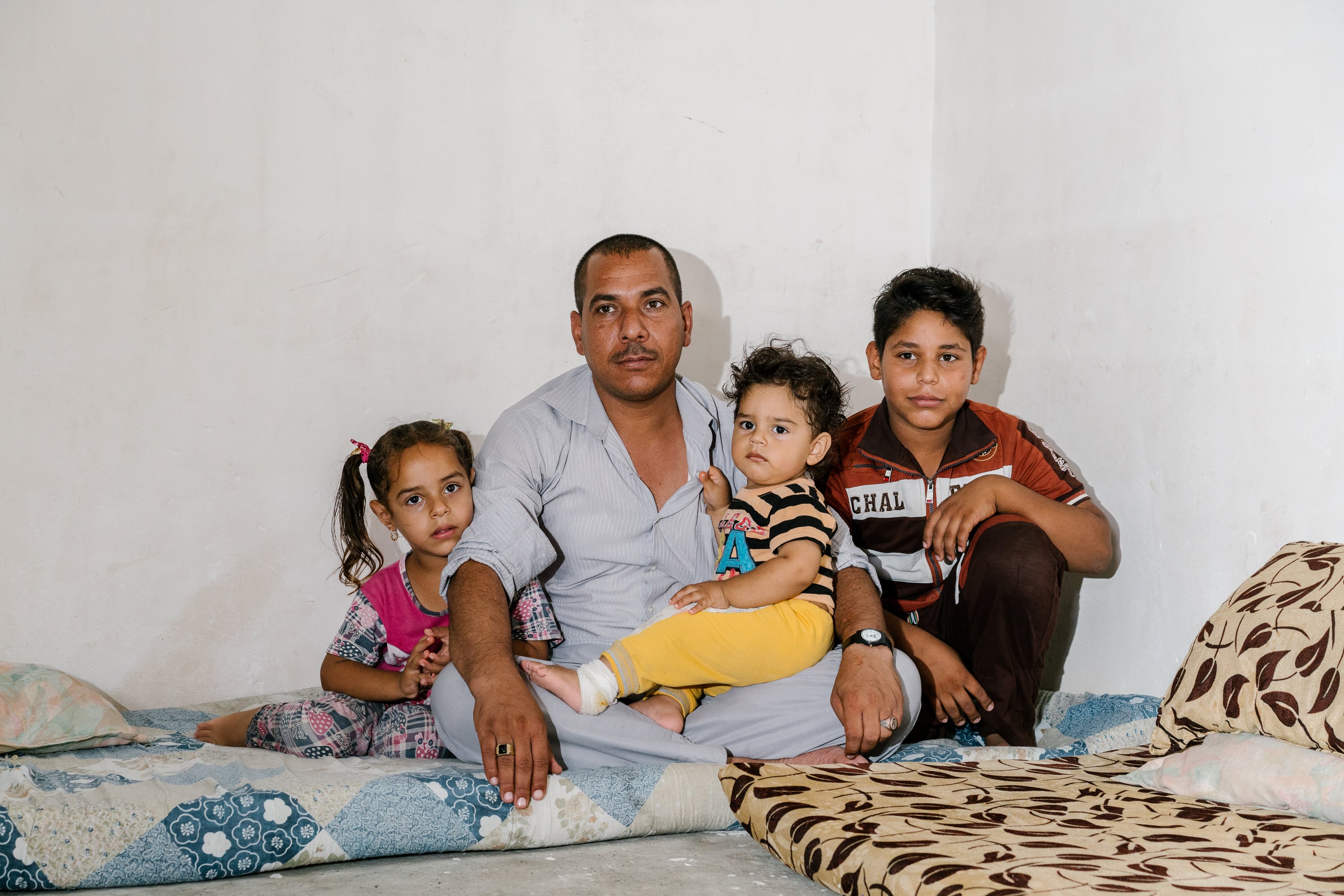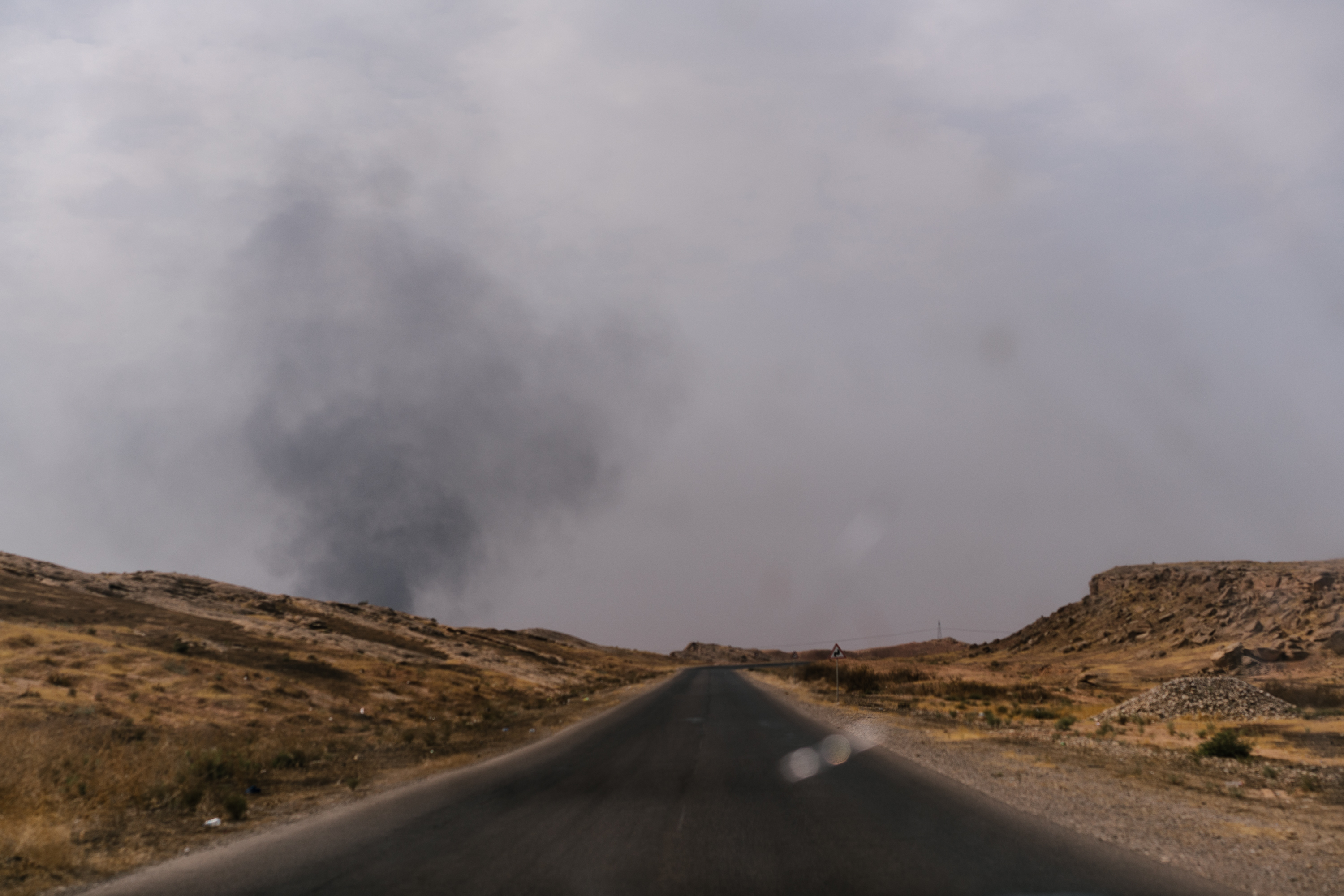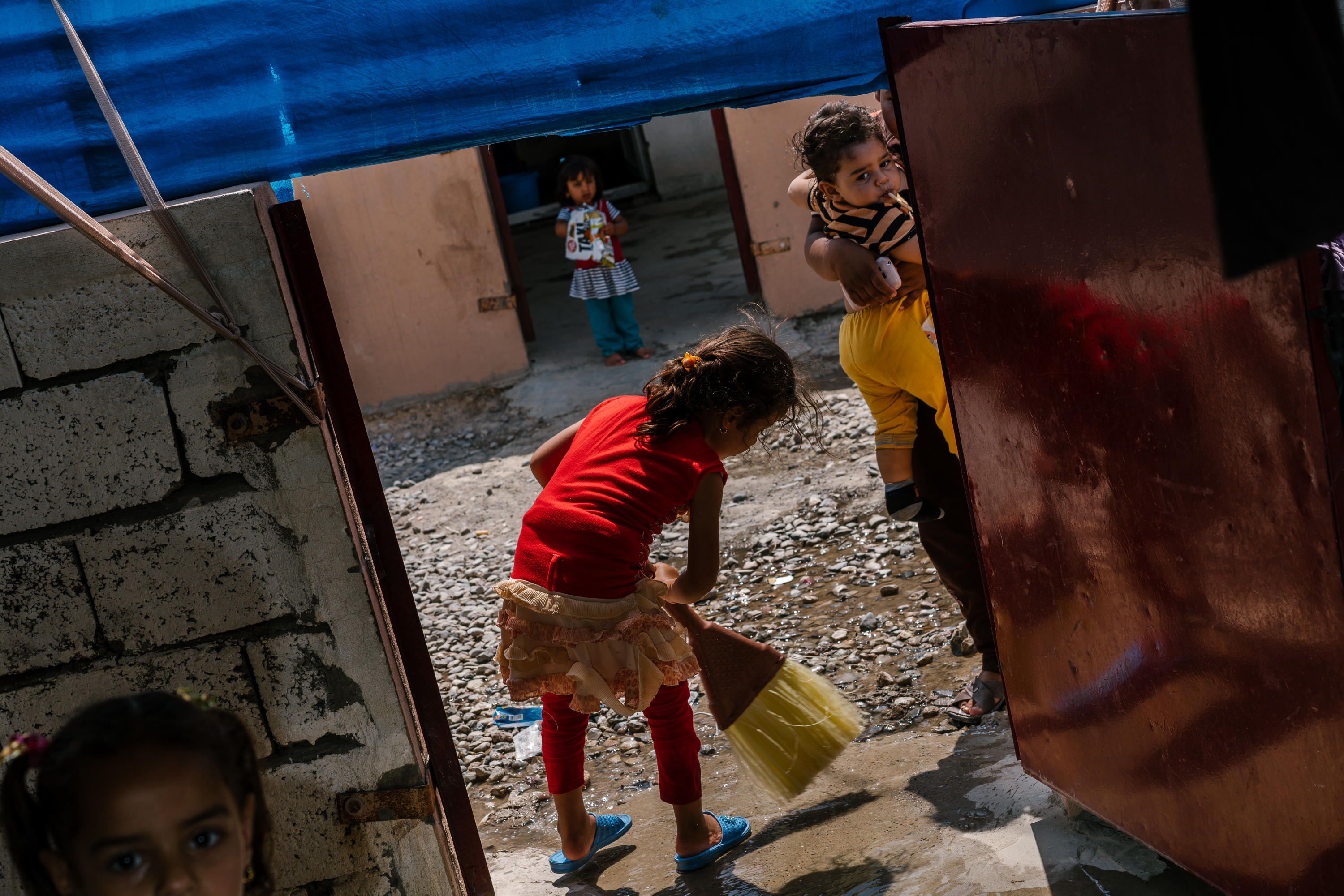Sitting cross-legged on the floor of his makeshift home outside of Erbil, Ahmed Qussai scoops up his youngest son from a mattress on the concrete floor, and kisses him on the cheek.
The 42-year-old former oil worker rocks the child back and forth as he tries to calm his tired cries. It’s hard to find a quiet place in the overcrowded Debaga camp for the displaced that Qussai has called home for the past eight months.
In the distance, black clouds of smoke billow from nearby oil fields - a reminder of both the life Qussai used to live and an indication of how the fight against so-called Islamic State is progressing.

In late August, the Iraqi army and its allies said they had freed Qussai’s hometown of Qarrayah from IS. But not before the group dug in, setting fire to oil wells in ongoing counterattacks and destroying the house Qussai had built for his family. Today, oil from attacks on nearby pipelines flows through the streets.
Like thousands of men in this camp, Qussai once worked with western energy companies, guarding the greatest asset of the semi-autonomous Kurdistan Regional Authority (KRG) - the oil and gas under the earth. Now, thanks to the Islamic State’s own thirst for oil, he spends his days cleaning his pre-fab container shelter and walking the aisles of the camp.
While he’s furious with IS, Qussai has other frustrations that point to major challenges for the KRG's post-IS future as political and military factions take advantage of their chance to change the stakes in the extractives industry.
“We weren’t happy living there,” Qussai says, pointing at images of the fighting back home on his television screen. “We weren’t getting any of the benefits of the oil we were protecting. The government just took the oil and didn’t work with the local people.”
Economic strain
Qussai and his friends were still guarding the oil fields when IS came tearing through Iraq in early 2014. They had been trained by the foreign oil companies that arrived en masse after the fall of Saddam Hussein in 2003, promising to develop the region’s potential.
And there were good years. As late as 2014 there was still talk of a Kurdish economic “miracle” as exports and growth increased steadily, and members of the diaspora returned to take part in an oil-fuelled construction boom.

But those days are long gone. As global oil prices dropped off, KRG’s oil-dependent economy was hard-hit. Then, after taking Ramadi and Fallujah, IS focused its efforts north and began to go after oil towns like Mosul and Tikrit with even greater intensity, cutting production and revenues further.
This, combined with the strain of hosting more than a million internally displaced people (IDPs) and at least 200,000 Syrian refugees means the KRG is now in serious economic trouble.
“The KRG needs more than one billion dollars per month to fit their needs and we have 40 percent per month of what we had before the war with IS,” Rabar Sdiq, the KRG’s Deputy Finance Advisor, told IRIN. “We cannot provide money for investment expenses because our [oil] production is so much less than our expenses. There are a lot of projects that have stopped.”
It’s not just investment that’s slowed. Civil servants haven’t been paid their full salaries in nearly a year, and at the largest public hospital in the capital of Erbil, doctors are making just US$500 per month -- about $2,000 less than they made before IS showed up. At night, many do shifts at private clinics.
“I come from a rich family, so it doesn’t have an impact on me,” says Kareem Shoukmali, director of the hospital, smoking a cigarette as he watches patients roll by on gurneys.
But Shoukmali says he has just $13,000 a month to keep the hospital going. “I just feel bad for the people who work for me. They have three or four other jobs. Sometimes they don’t show up for work and I don’t feel like I can yell at them. They need to make money,” he says.
Elsewhere in the capital, children pack into consolidated classrooms at the local primary school, fighting for seats because the teaching staff has been cut.
Many cash machines around the city are no longer stocked with cash, but near the international airport, 50-story luxury apartment buildings, adorned with crystal chandeliers, still house international oil traders and contractors, as well as government employees closely linked to the region’s oil market.
In one of the local markets downtown, though, men working in gold and silver shops are thinking of closing their storefronts. One store owner said business was down nearly 20 percent since the beginning of the year.

Baghdad v Erbil
Baghdad and Erbil have been fighting over oil for decades, and the epicenter of this battle is the resource-rich governorate of Kirkuk.
The Kurds took advantage of the Iraqi army’s all but total collapse in the face of IS to take control of oil that had previously been under the grip of Baghdad in key parts of Kirkuk.
Baghdad cut the Kurds’ share of the federal budget in January 2014 (with some dribs and drabs since then), in response to the region’s decision to export oil independently. Their dispute centers around Kirkuk and the share of the revenue from its exported oil, and earlier this year exports from Kirkuk stopped altogether. Baghdad and Erbil announced a deal in September, sanctioned by the United States, that resumed business from Kirkuk's oilfields and split the revenues between the two governments. The agreement is said to be closely tied to cooperation between Kurdish militias and Iraqi forces around the upcoming battle for Mosul.
The dispute over independent Kurdish exports goes on, and some Kurdish officials believe the answer is partition. The KRG’s own parliament has not convened in months and the two leading political parties are at odds over how to divide power in the ministries.
Fouad Hussein, a member of Kirkuk’s provincial oil and gas committee, told IRIN that as the economy has faltered, some locals have moved into IDP camps because at least they have “regular food and water”.
It’s true that there’s no sign of oil riches on the outskirts of Kirkuk besides the orange flames that sprout up from the refineries on the road from Erbil.

A small checkpoint – a plastic chair, a small cone and two men – guards the entrance of the town of Dibis where buildings are crumbling and several have no roofs. The streets aren’t paved, and there is just one restaurant that serves fish from the nearby river.
Just behind the village, about five miles down the road, oil fields that produce massive amounts of cash for the government are protected by some of the most well-trained and equipped soldiers in the whole region.
Commander Amal Kirkuki, a pershmerga commander who is in charge of the soldiers guarding the oil and gas in Dibis and its surroundings, explains that the fighters’ job is to “ensure the [IS] attacks on these pipelines stop".
He discusses the fights of the past two years, pointing out photographs of IS safe houses and tunnels confiscated after raids. "Every movement we made was about protecting the oil," he says of key 2015 battle.
Erbil v Erbil
The oil disputes have caused further rifts between rival political parties in the KRG, as well as between the government and its people.
Reports that corruption is responsible for keeping oil profits from the Kurdish people are widespread, and a topic of discussion among locals.
“Our situation is the way it is not only because of the war, but because the government has no plan in place to save money,” says Kasim Asi, 32, a school teacher from a town in Erbil Governorate.
“If the political parties in the KRG can’t stop fighting and make decisions, how are they supposed to make progress with Baghdad?”

Estimates vary on the scale, but one 2013 report by the Brookings Institute put losses in Iraq due to corruption and mismanagement at $20 billion in that year alone. But that’s in the whole of Iraq.
In the KRG, some officials have alleged that the region’s own Ministry of Natural Resources is mismanaging tens of millions of dollars of public funds from the oil industry.
Since its formation nearly 10 years ago, the ministry has not once had an independent audit, although it’s currently in the process of bringing in an international accounting firm to do this job.
While representatives from the ministry declined to speak to IRIN, officials at the finance ministry said most of the money generated by the natural resources ministry goes directly to paying public servants, yet they haven’t been paid.
Sherko Jawdad, a member of parliament and of its Oil and Gas Committee, was recently brought to court for accusing the Ministry of Natural Resources of embezzling funds. His case is pending, and he’s not backing down.
“Oil is only for the politicians. We know about all the houses they built with the money,” Jawdat told IRIN.
The future
Despite all that has gone wrong, much of the hope for post-IS recovery is still pinned on oil. Local politicians say they are trying to ensure the people benefit from what’s left of the industry and the region’s natural resources.
Fouaid Hussein of Kirkuk’s provincial council says he is doing everything he can to bring oil rights back to the people of the city.
“I have promised to serve the city’s oil needs and oil sits at the centre of our political, social and economic issues,” Hussein told IRIN. “The government takes all of Kirkuk’s oil and money. Kirkuk is the richest place when it comes to oil reserves, but it has the poorest people.”
Last year, Hussein says he tried to set up meetings with officials in Baghdad and the Ministry of Natural Resources in Erbil to make his case that more oil revenue should be circulated into the local economy for infrastructure projects.
But those meetings never panned out. Hussein, though, promises he is a “community man” and is doing “all he can to inform the people of his progress.”
Officials like Hussein are the only liaisons between people like Qussai and the decision makers in the Ministry of Natural Resources. But he admits he has not held a single community forum or meeting with locals since his election.

Meanwhile, people like Qussai remain in limbo. He’s unlikely to be able to return home anytime soon and there will be no good outcome for him and his family unless the economy improves, he says.
Despite Qussai’s anger toward the government and the western oil companies, he talks about his time patrolling and guarding the oil with pride. He says he misses his time looking after what has become the most valuable asset in the Kurdish region.
“I spent everyday for almost six years training with westerners, learning about oil -- how to protect it, how it works, things like that,” Qussai says. “We worked all over the country. We even worked patrolling the black market in Anbar.
“When the Americans came to Iraq, they told us we would be living in castles with all the oil investment that would be coming in,” Qussai recalls, redirecting his gaze toward his children who are washing their feet with a hose in the corner of their container. “They didn’t tell us we would be living like this.”
(TOP PHOTO: Men wait in line for food distribution at Debaga camp. Jake Naughton/IRIN)
eb/as/ks





